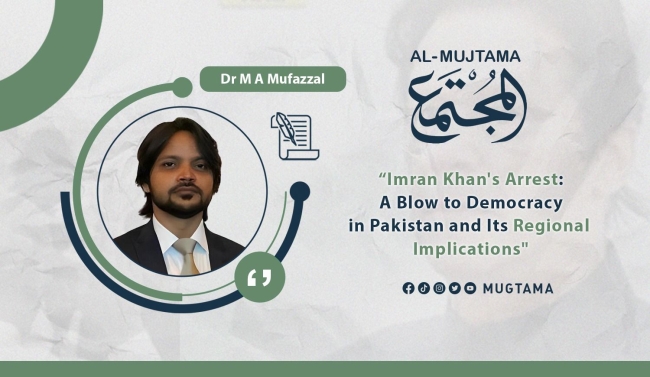“Imran Khan's Arrest: A Blow to Democracy in Pakistan and Its Regional Implications"
The apprehension of the erstwhile Pakistani Premier, Imran Khan, has engendered tumultuous events and resulted in the discontinuation of internet services throughout the nation. The detention occurred during Khan's court appearance to confront corruption charges, and ensues his allegations of two assassination attempts orchestrated by the military establishment of Pakistan. Khan's adherents have demonstrated their resentment on the thoroughfares, with an officer in the municipality of Quetta reportedly shooting a protester dead. In Karachi, a police vehicle was conflagrated, and in Lahore, supporters desecrated the military corps commander's domicile, vandalizing windows and setting ablaze furniture. Mobile internet services have been curtailed nationally, and the ability to access Facebook, YouTube, and Twitter has been restricted.
The detention of Khan marks the most recent episode in a political and economic crisis that ensnares the former prime minister in a contest against the military and the incumbent government, headed by his successor, Shehbaz Sharif. Khan alleges that Sharif's administration conspired against him to seize his authority and pose threats to his personal safety, allegations that Sharif and his associates deny.
The outbreak of violence in the aftermath of Khan's detention serves as a stark reminder of the profound political and economic crisis that grips Pakistan. Since his removal from power in April of the previous year, Khan's popularity has been on the ascent, owing to his steadfast commitment to challenging the military establishment, which has long functioned as Pakistan's political marionettist. Despite the allegations of corruption leveled against him, Khan remains a formidable presence in Pakistani politics, and his adherents have mobilized to demand his immediate release. The government's reaction, which involves the suspension of internet connectivity and other measures, provokes concerns over the condition of democracy in Pakistan.
Pakistan has a long history of political instability, marked by military coups, rigged elections, and sectarian violence. Despite some progress in recent years, including the historic election of Khan's Pakistan Tehreek-e-Insaf (PTI) party in 2018, the country remains mired in corruption, poverty, and religious extremism.
Khan's arrest, on charges of inciting violence during a 2014 anti-government protest, is seen by many as a politically motivated move by his opponents to silence him and his party. PTI officials have denounced the charges as baseless and accused the government of trying to undermine democracy.
The violent protests that followed Khan's arrest, which saw his supporters clash with police and vandalize public property, are a reminder of the fragile state of Pakistan's democracy. The government's heavy-handed response to the protests, including the use of tear gas and water cannons, has only inflamed tensions and raised fears of further violence.
The arrest of a former prime minister and the outbreak of violent protests are serious setbacks for Pakistan's already fragile democracy. They undermine public trust in democratic institutions and could further polarize society along ethnic and religious lines.
Moreover, the turmoil in Pakistan could have wider regional implications, given the country's strategic location at the crossroads of South Asia, the Middle East, and Central Asia. Pakistan is a key ally of the United States in the war on terror and a major player in the geopolitics of the region.
Any disruption to Pakistan's stability could have serious consequences for regional security and stability. It could also complicate efforts to resolve longstanding conflicts in neighboring countries, and fuel extremist movements across the region.
To avoid further escalation of the current crisis, Pakistan's political leaders must demonstrate a commitment to democratic values and institutions, and work together to address the country's many challenges. This includes addressing corruption, improving governance, promoting economic growth, and strengthening social cohesion.
It is imperative that the government undertake measures to reinstate serenity and ensure the sanctity of the democratic process. The detention of Khan, who had applied for bail in two graft cases, serves as a pointer to the necessity of enhanced openness in the judicial system of the country. The accusations leveled against Khan ought to be examined in a just and unbiased manner, with any instances of wrongdoing being redressed through the proper legal channels.
Pakistan's multifaceted predicament, both politically and economically, necessitates a comprehensive and multifarious resolution. The government must make efforts to appease Khan's supporters, who are beset by a host of challenges such as inflation and scarcities of food, while simultaneously ensuring that the military does not encroach on the democratic process. The termination of internet services, although it may have been necessary to maintain public order, serves to highlight the pressing need for greater transparency and accountability within Pakistan.
The international community, including the United States, China, and other regional powers, must also play a constructive role in supporting Pakistan's democratic transition and promoting regional stability. This could include offering economic assistance, supporting civil society groups, and encouraging dialogue between political leaders.
In conclusion, Pakistan's current political turmoil poses a serious threat to regional stability and security. It is imperative that Pakistan's political leaders and the international community work together to support democratic institutions and promote economic growth and social cohesion. Failure to do so could have serious consequences for the region and beyond.
-------------
*The opinions expressed in this publication are those of the authors. They do not purport to reflect the opinions or views of "Al-Mujtama" or its members.


